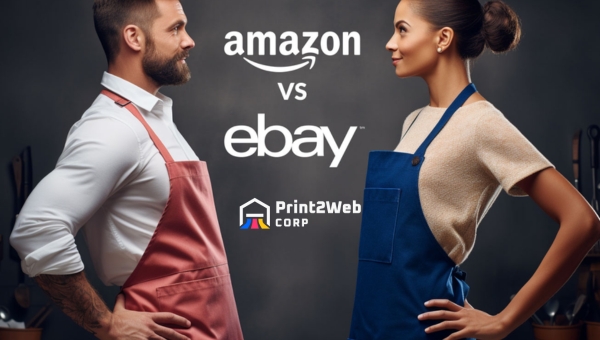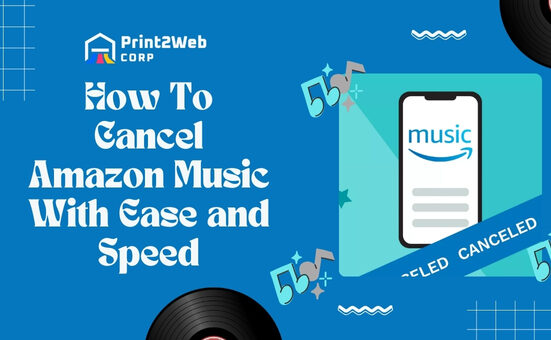Welcome! You’re probably wondering about “eBay vs Amazon,” which is the ultimate platform to sell your stuff, right? Well, you’re not alone. Many people scratch their heads when deciding where to list their products. Will it be the worldwide yard sale known as eBay or the colossal giant Amazon? Let me capture your curiosity even more – have you ever thought about who wins in a head-to-head bout between these two selling Titans?
Considering eBay versus Amazon for selling online can feel like standing at a crossroads. Each path leads to a vastly different journey with its own set of rewards and challenges. You might think both sites are just about buying and selling, but there’s more beneath the surface than meets the eye.
What You Will Discover Here
- The real scoop on fees: where does your wallet stand a chance?
- Battle of benefits: which platform should get your loyalty chip?
- Pitfalls and profits: can either truly claim victory over your bank balance?
- Inside info: will buyers be at your virtual storefront’s doorstep eagerly waiting?
eBay vs Amazon: Understanding the Fundamentals
In the field of online retail, both eBay and Amazon hold critical positions. They are dominant platforms for e-commerce, open to individuals and businesses who want to buy or sell products online.

There are fundamental differences in their structures and business models which we need to understand when comparing these two juggernauts.
What is eBay and How Does it Work?
eBay is a big global marketplace where virtually anyone can buy or sell almost anything, from books to furniture to cars. The process is simple: as a seller, you post an item for sale including a description, photos, selling price, etc., then as buyers use the platform they can compare prices from different sellers if you’re selling a common item like electronics or clothing.
The seller can opt for an auction-like bidding process where potential buyers bid against each other until the auction ends. Alternatively, they could set a fixed price for instant purchases called “Buy It Now”. After that transaction occurs between buyer and seller directly through secured payment methods or through PayPal which is widely accepted on eBay.
What is Amazon and Its Business Model?
On the other side of this comparison stands Amazon, another major player in the online retailing business but operates differently than eBay. It started as an online bookstore but has since expanded its product offerings vastly becoming an everything store with millions of products available under various categories from electronics to groceries.
Its business model revolves around buying products at wholesale rates from manufacturers directly or third-party sellers and then selling those items at competitive market prices directly to consumers effectively maintaining a huge inventory of goods unlike eBay it doesn’t stock any items by itself but rather facilitates transactions between buyers and sellers only.
Another key part of its strategy lies in services like Amazon Prime membership providing benefits like faster delivery times, access to streaming video content, etc., making it highly attractive for frequent shoppers on their platform.
Also Read: Approval to Sell Toys on Amazon: Ultimate Success Guide
The Showdown: eBay vs Amazon for Sellers
When it comes to online retail platforms, eBay and Amazon are two giants that dominate the market. Both of these platforms offer unique opportunities for sellers across the globe, but each comes with its own set of benefits and drawbacks.

By understanding the key aspects such as seller fees, fulfillment methods, and paid advertising options associated with each platform, sellers can determine which one is more suitable for their business needs.
Analyzing Seller Fees on eBay and Amazon
To start with, it’s important to understand how seller fees work on both platforms. Seller fees are effectively the cost you have to pay in return for using the platform’s services to sell your products. On eBay, these fees usually come in three parts: insertion fees (listing a product), final value fees (a percentage of the selling price), and optional promotional listing upgrade charges which vary depending on your decisions as a seller.
However, Amazon follows a more simplified fee structure where there’s a referral fee that ranges from 6% to 45% based on the product category and an additional variable closing fee if you sell media items – books, movies, etc., Additionally, those who wish to be ‘Professional Sellers’ might need to pay an extra monthly subscription charge.
Fulfillment Methods Face-off
Next up is comparing Fulfillment methods offered by both platforms. The fulfillment process includes storage of products till sold; packing & shipping them once sold; and managing customer returns etc., eBay primarily works as just a platform hosting your listings while making you responsible end-to-end end right from maintaining inventory to dealing with returns.
However, Amazon provides robust fulfillment options especially highlighted by its Fulfilled-by-Amazon (FBA) service where virtually all above said key processes are taken care of by Amazon itself albeit at extra costs. While this can take much of the burden off sellers’ shoulders, it also increases costs and somewhat makes sellers more dependent on Amazon’s policies and decisions.
Ultimately, choosing between these two platforms depends entirely on businesses’ individual preferences, knowledge & capabilities regarding utilizing these tools effectively.
Also Read: What Time Does Amazon Deliver? Uncover Delivery Secrets!
eBay vs Amazon – Where Do You Earn More?
When it comes to picking a platform for your online business, the decision between eBay and Amazon can be tough. One of the biggest factors you’ll consider is where you’ll earn more money.

Let me break down the differences in getting paid and potential profit margins that might help you make that choice.
| Criteria | eBay | Amazon |
|---|---|---|
| Selling Fees | Variable, depending on the category, but generally 10 – 12.35% of the price plus shipping and handling. | For individual sellers, $0.99 per item sold, and for Pro Merchants it’s $39.99/monthly subscription fee plus additional selling fees which range from 6% to 45%, depending on the category |
| Ease of Use | Easy to list items with a simple process. Allows offers and negotiations with buyers which can lead to greater profits for sellers. | Streamlines the listing process by providing existing product information for similar items |
| Customer Base | Approximately 300 million active customers; a massive customer base means a high potential volume of sales | Sellers can utilize Fulfillment by Amazon (FBA), where Amazon stores, packs, and ships products on behalf of sellers (fees apply) or choose to handle shipping themselves. |
| Shipping & Handling | Generally, sellers handle their own shipping unless opted into eBay’s Global Shipping Program. | The importance is placed on seller feedback ratings; negative ratings are detrimental as they can cause fewer sales in the future. |
| Ratings & Reviews | (Rotating cost rules carry a first-in, first-out system). If multiple packages of an item in stock with different per-unit costs/prices paid, then the oldest inventory gets sold out first. | Relies more heavily on product reviews rather than seller ratings; it is easier for new sellers to compete. |
| Shipping Costs Rule | (Not included in final fee value). It gets added up separately. | (Included in the referral fee calculation.). It gets included in the total amount of sales before applying the referral fee percentage. |
| Sold Item Cost Calculation Rule | For individual sellers, $0.99 per item sold, and for Pro Merchants it’s $39.99/per monthly subscription fee plus additional selling fees which range from 6% to 45%, depending on the category | (Rotating cost rules carry a first-in, first-out system). If multiple packages of an item are in stock with different per-unit costs/prices paid, then the oldest inventory gets sold out first. |
| Returns & Refund | Offers a money-back guarantee policy that requires sellers to accept returns for items that are not as described | Amazon has a comprehensive return policy and handles most returns and refunds |
Seller’s Dilemma: Choosing Between eBay and Amazon
When it comes to selling online, I often find myself caught in a common conundrum: choosing between eBay and Amazon. Each platform has its unique pros and cons which you should carefully consider before diving in. Let me help you understand them better.

Pros of Selling on Amazon – Is Bigger Always Better?
Amazon is a powerhouse, offering a vast audience that might seem irresistible for sellers looking to expand their reach. Here’s what makes it an appealing choice:
- Massive Reach: With millions of customers worldwide, your products are exposed to an enormous audience.
- Brand Recognition: Being associated with Amazon provides credibility that can be comforting to buyers.
- Prime Membership: Through the Fulfillment by Amazon (FBA) program, sellers can leverage the Prime badge for better visibility and customer trust.
- Buy Box Feature: Winning the Buy Box means a prominent display, placing your listing front and center for potential customers.
However, always remember that with larger size comes increased responsibilities and potential challenges.
Cons of Selling on Amazon – When Big Comes with a Price
Selling on such a vast marketplace also comes with its share of drawbacks:
- Hefty Competition: On Amazon, you’re competing against thousands of other sellers, including established brands.
- Complex Fee Structure: Understanding various fees can be challenging; everything from referral fees to FBA fees needs consideration.
Can You Make More Money? This largely depends on your niche; high competition may demand lower pricing strategies, affecting profits. Understanding these factors is crucial because while selling through this giant marketplace grants access to more customers, it might squeeze your profit margins due to stiff competition and higher costs.
The Advantages of Selling on eBay
eBay presents itself as an online auction house but has evolved into much more:
- Unique Auction Format: Offers opportunities like setting reserve prices or allowing buyers to bid against each other.
- More Control Over Listings: Personalize listings extensively, which could improve buyer engagement.
- Diverse Buyer Base: Known for collectibles or rare items drawing niche markets potentially willing to pay more.
Each benefit uniquely contributes toward making eBay a platform that could suit various selling styles or specialties quite well.
Potential Downsides Running an eBay Store
Just as there are highlights, beware of certain pitfalls too:
- Variable Customer Base: While niche buyers are great, they may not provide the consistent traffic seen on mainstream platforms like Amazon.
- Limited Global Reach: Compared with Amazon, eBay’s international presence isn’t as strong, limiting market exposure.
- Potentially Lower Visibility: Without options like Fulfillment by eBay (which doesn’t exist), you won’t have similar programs like FBA that boost product visibility through services like Prime shipping spanning across massive customer bases.
Now that I’ve laid out the key features along with the advantages and disadvantages of both platforms—determining whether bigger is always better would require personal evaluation based on individual business models. Whether one opts for the extensive reach and structure of Amazon or goes for the distinctiveness flexibility offered by eBay will depend greatly on product types, targeted audiences, long-term objectives, and seller resources available.
Also Read: Review on Amazon: Uncover Your Own Feedback!
FAQs
Is it better to buy on Amazon or eBay?
It often depends on what you’re looking for. Amazon is known for new items and fast shipping, while eBay can be great for unique finds or second-hand goods.
Do more people use Amazon or eBay?
More people use Amazon. It’s one of the biggest online retailers and has a larger customer base than eBay.
Who makes more money, Amazon or eBay?
Amazon makes more money overall due to its massive scale and diverse business operations beyond just its marketplace.
Is it better to sell on eBay?
For unique items or collectibles, or if you prefer auction-based selling, then eBay might be the better choice. For new goods and a more extensive customer reach, selling on Amazon could be advantageous.
Also Read: How to Change Amazon Password Easily? – Quick Guide
Conclusion
In the big debate between eBay and Amazon, the winner isn’t clear-cut. It depends on personal preferences, business goals, and what you’re selling. If you like a more open marketplace and potentially higher profit margins, eBay could be your pick.
But if you want unmatched customer reach and efficient fulfillment options, Amazon might be your best bet. Whether it’s loyalty or trust from buyers, both have their merits. Each platform charges different fees that will affect your bottom line differently. Amazon, with its larger audience and streamlined operations, and eBay offer a more personalized approach to selling.







